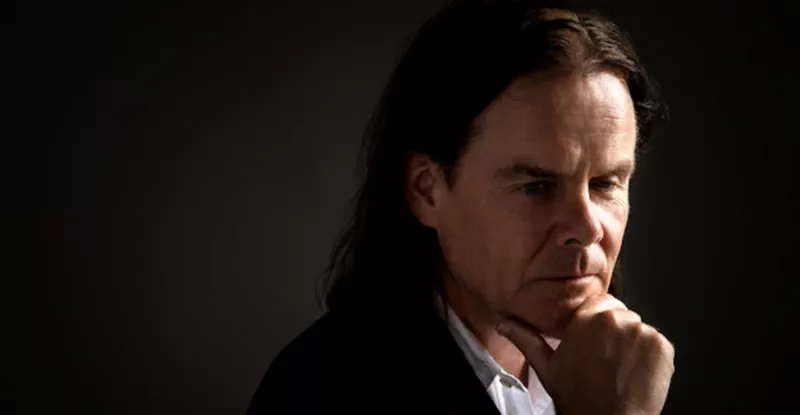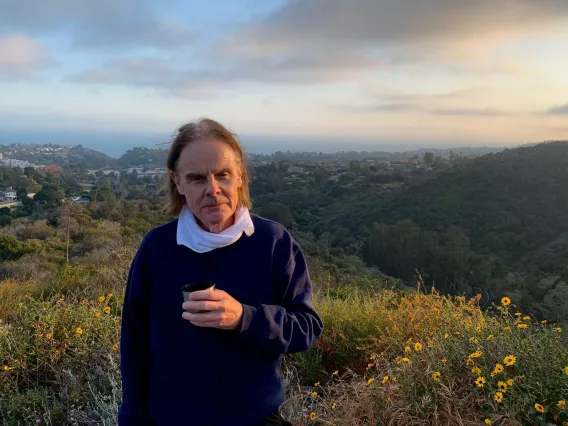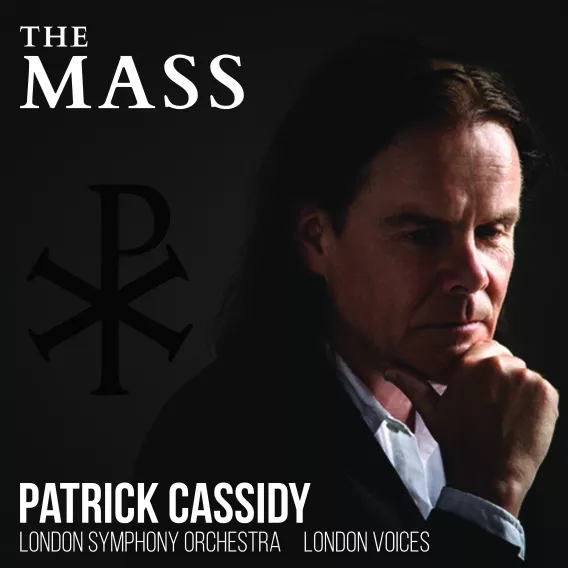

When we sat down (virtually) with Patrick Cassidy in late 2020, it was a grey day in Limerick. “It’s sunny here in LA” our favourite mathematician-turned-composer teased. It is now 30 years since this self-taught composer gave up a career which was somewhat mapped out for him, instead going from numbers to notes. Musical notes, that is. And what seems to increase year after year is Patrick’s passion for doing what he loves.
Student concerts
“Martin Hayes, the great fiddler, was in college at the same time as me” Patrick begins “and we formed a duet. We were good!” Patrick recalls there not being too many musicians in college back then. “And traditional music wasn’t as popular as it is now” he adds. Together, Patrick and Martin performed a number of concerts in the Students Union, located in the original Stables. “Of course, all of my classmates and some of our professors would come along. The college was small then, everyone knew each other and many of the professors were our friends.”
Patrick was in UL (or NIHE, as it was) pursuing a BSc in Applied Maths, graduating in 1985. But he always found time for music. “Although my main instrument is the Irish Harp while studying at UL I would go to piano lessons once a week at the School of Music in Limerick. I also had a harp and string quartet group with some musicians from there. We did lots of concerts in the Limerick area.”
Is there a relationship between the mathematical side of the brain and music composition? “Yes, that’s what the scientists tell us” Patrick says “In fact, many physicists are good at music”.
Maths & Stats
After graduation, Patrick spent four years with Irish Marketing Surveys (IMS) in Dublin as a statistician. “They were the biggest market research company in Ireland at the time and amongst other things, they conducted political opinion polls for the Sunday Independent. Many colleagues at the company are still my friends to this day.”
During this time, Patrick recorded his first album ‘Cruit’ for Gael Linn Records, featuring music by 17th and 18th century Irish Harpers, arranged for Irish harp and baroque ensemble. Subsequently, he received a commission from the Irish American Cultural Institute to compose a classical piece with an Irish theme.
“So, I quit my job in 1989 to concentrate on composition,” he says, adding “Plan B was to go back to the day job if it didn’t work out, but I always believed it would”.
And it did. Next emerged his epochal work ‘The Children of Lir' which resulted in Patrick being bestowed with the Medal of Honour. A Cantata with libretto in the Irish language, it premiered at the National Concert Hall in Dublin and remained at number one in the Irish Classical Charts for a full year. It was the first Cantata ever written in the Irish language and the BBC produced an hour-long documentary on the piece.
Other works include ‘Deirdre of the Sorrows’ and ‘Famine Remembrance’, which had its premiere at Saint Patrick's Cathedral, New York. In June 2007, ‘Famine Remembrance' was also performed at the opening of Toronto's Ireland Park with the President of Ireland as special guest.

City of Angels
Born in Claremorris in Co. Mayo and raised in Shannon, Co. Clare, Patrick left Ireland in 1999 to move to Los Angeles. Why LA? “It’s where the opportunities took me. When I took up composing music full time, I had no idea I would end up here in LA”. And LA is where Patrick lives in close proximity to his brother Frank who is his manager. “Frank is also a good singer” Patrick adds. Another major presence in Patrick’s life is his little rescue dog. “We called him Finn because he’s white… he’s a complete mongrel, the best kind of dog.”
Hollywood & Hannibal
In addition to his classical work, Patrick scores film soundtracks. Well-known credits include Hannibal, Veronica Guerin, Confessions of a Burning Man, Salem’s Lot, King Arthur, Layer Cake, Che Guevara, Ashes and Snow, Kingdom of Heaven, The Front Line, L'Aviatore, Kill The Irishman, Calvary, 1916 The Irish Rebellion.
Among our favourites, we tell Patrick, is his famous, beautiful, haunting aria ‘Vide Cor Meum’ composed as a “mini” Opera for the Ridley Scott film, Hannibal. This aria was presented at both the Oscar and Emmy Awards and has appeared in multiple top-ten lists and essential collections throughout the world. Collections which include the Warner Classics ‘40 Most Beautiful Arias’ where significantly, Patrick Cassidy is noted within the collection as the only living composer.
Dante
Among Patrick’s newest works is ‘The Mass’ which was recorded with The London Symphony Orchestra and London Voices and released in November 2019. It is a large-scale setting of the Mass in Latin. Another ambitious new project is capturing even wider attention. Patrick has written an opera ‘Dante’ which will premiere in Verona in September 2021, to coincide with the poet’s 700th anniversary. Patrick is a knight Order of the Star of Italy, conferred by the President of Italy and bestowed with the title of Cavaliere dell’Ordine della Stella d’Italia. We tell Patrick we are eagerly anticipating the premiere of ‘Dante’, having attended an introduction to his opera given by Patrick at the Italian Cultural Institute’s Dante Summer School in Dublin last year.

Family & Home
“I love coming back to Ireland, especially to work on projects,” Patrick tells us. One such project which is still fresh in all our memories is ‘Mise Éire’, the 1912 Irish-language poem by Irish poet and Republican revolutionary leader Patrick Pearse. It was set to music by Patrick for Ireland’s centenary commemorations of the 1916 Rising, performed by the RTÉ Concert Orchestra with vocals by Sibéal Ní Chasaide, a close family member.
Does Patrick come from a musical family, we ask? He was brought up speaking the Irish language in a family of ten children. “Yes, music was a big thing in our family. My father loved music. He was a beautiful singer, with a tenor voice. He also played the violin and sent us all to music lessons.”
Patrick also tells us the story of how his parents met. “My father was a pharmacist and my mother applied for a job in the shop.” He also adds “Then after they got married and had a family, she went to college and qualified as a pharmacist herself!”
Obviously curtailed from travelling right now, Patrick - who was honoured with a UL Alumni Award in 2007 for his outstanding contribution to arts and culture - misses his family here. “Ireland is home, I am an Irishman. I live in LA and have two passports”. Will he be voting in the upcoming elections? “Of course” he replies emphatically “for humanity”.
On his visits home, Patrick likes to stroll around the campus, often dropping into the UL Alumni office for a chat and a coffee. Thinking back on his time as a student, he says “I am very fond of UL, I have great memories. I loved studying there, it was a fantastic atmosphere, such a beautiful place”.
Back to today, we ask how he has been impacted by the pandemic. He jokes and says “Well, composing can be quite solitary, I was already living like a hermit!” He adds “I also really miss not being able to go to the pub, stand by the bar and meet up with my friends”
He does worry about his mother, Kathleen back home. “It is hard for her like it is for so many others,” he says, adding “I also worry for people in the music business… I had two concerts in Ireland cancelled this year and everything going forward is now in jeopardy”.
Risk and Reward
Reflecting on his decisions in life, Patrick says “Yes, it is easier to get a job”. He then refers to UL’s Founding President when he says “Do you know that Ed Walsh said to me, I admire risk takers … and I kind of follow that maxim too, if in doubt, do it!”.
He concludes “You only live once. There are no guarantees in life. It would be a pity to waste your life doing something you don’t love, when you have the opportunity to do it, even if it is a risk.”
“A calculated risk”, the former Statistician adds with a smile.
 Student Centre (SU-101)
Student Centre (SU-101)
University of Limerick
Limerick, Ireland
Phone: 353 61 202475
Email: ulaa@ul.ie